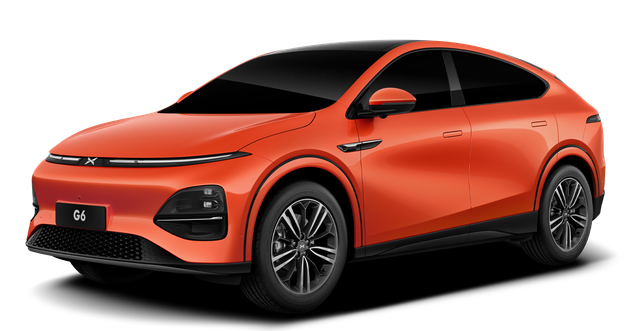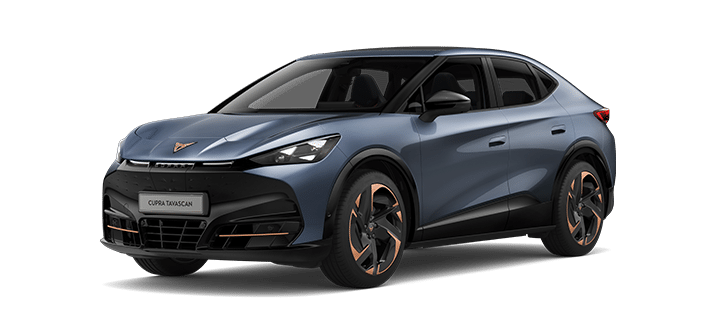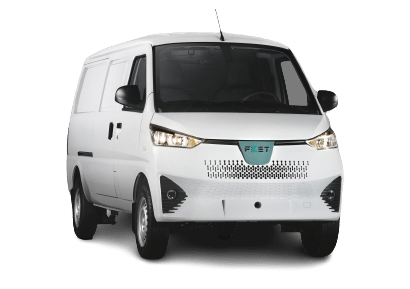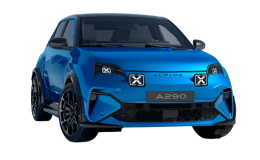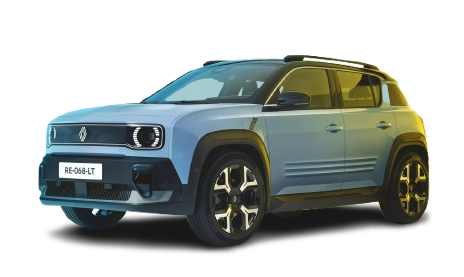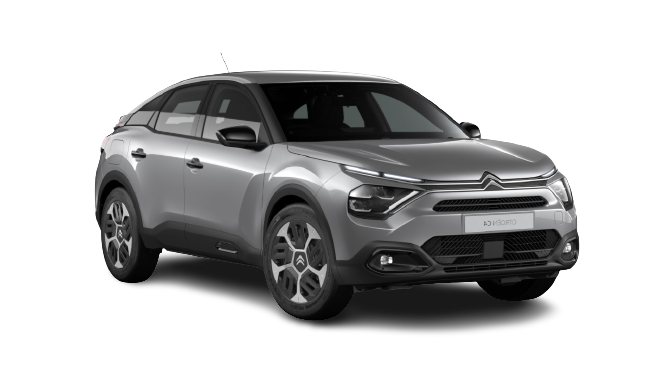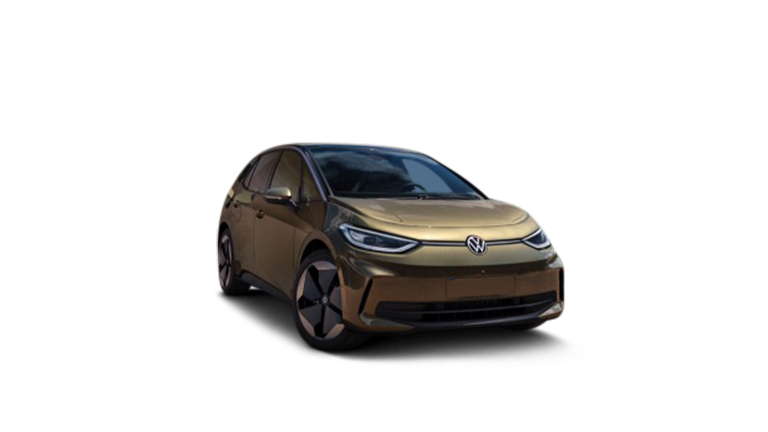With Beev
Switch to
Electric car
or install your
Charging station
For individuals and businesses
Ferrari: a 100% electric model in 2025?
A starting price of around 500,000 euros
Ferrari plans to launch its first 100% electric model in the fourth quarter of 2025, marking a milestone in the brand's history. Although specific details remain limited, Ferrari promises that this electric car will be true to the brand's DNA, offering exceptional performance and a unique driving experience. The base price is expected to be in the region of 500,000 eurosmaking it one of the most expensive models in the current range. Ferrari is committed to developing cutting-edge technologies for this vehicle, including high-efficiency electric motors and hand-assembled structural batteries.
The brand is also paying particular attention to the sound aspect, promising a specific soundtrack to preserve the characteristic emotion of driving a Ferrari. This first electric model is part of Ferrari's progressive electrification strategy, which aims to achieve carbon neutrality by 2030.
An electric supercar faithful to Ferrari DNA
Ferrari is set to revolutionize the world of supercars with its first all-electric model, while remaining true to its legendary DNA. The Italian brand, synonymous with performance and automotive passion, promises that this new electric supercar will not compromise on the driving sensations and emotion that characterize its vehicles. By integrating cutting-edge technologies, Ferrari ensures that this model will deliver breathtaking performance, with lightning acceleration and exceptional handling. In addition, the brand is working intensively on creating a unique sound signature for this vehicle, to preserve the distinctive roar that thrills Ferrari enthusiasts.
This ambitious project testifies to Ferrari's commitment to embracing the future of electrification while honoring its heritage, ensuring that every moment spent behind the wheel of this electric supercar will be an unforgettable experience, worthy of the prancing horse emblem.
Ferrari electric: technological challenges and innovations
Ferrari is resolutely entering the era of electrification, while seeking to preserve its DNA as a prestigious brand. To meet this challenge, the Ferrari brand is implementing several major technological innovations:
1. Development of high-performance electric motors
Ferrari designs electric powertrains capable of delivering exceptional performance, true to the brand's reputation.
2. Advanced batteries
The company is working with partners in Europe and Asia to develop the next generation of energy-dense solid-state batteries.
3. Component integration
Electric motors and batteries will be assembled in Maranello and integrated into the chassis to optimize vehicle weight and rigidity.
4. Unique sound signature
Ferrari is working on a specific soundtrack for its electric models, aimed at preserving the characteristic emotion of driving a Ferrari.
5. Active suspension
The brand is developing active suspension technology to lower the center of gravity when cornering, improving speed and performance.
6. Flexible production
The new "e-building" production site will provide greater flexibility to meet demand and reduce development time for new models.
These innovations aim to meet the major challenges of electrification for Ferrari, including preserving the brand's characteristic performance, exclusivity and driving experience. By investing heavily in research and development, Ferrari strives to maintain its leading position in the luxury sports car segment, while adapting to new environmental requirements and market developments.
The end of the V12, many new models and electrification: Ferrari's plans for the future
Ambitious targets: 60% electrified by 2026, 80% by 2030
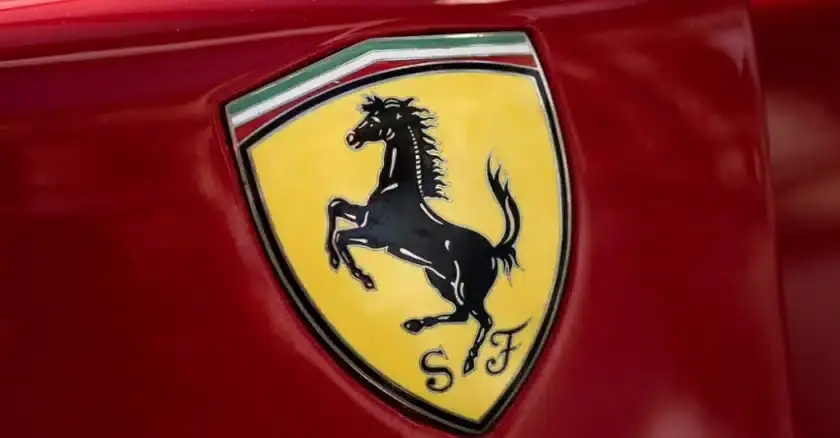
Ferrari is firmly committed to the era of electrification with the opening of a new production line at Maranello, scheduled for early 2025. This state-of-the-art facility will house production of the Purosangue SUV, whose commercial success has exceeded expectations, as well as the SF90 Stradale, the brand's first plug-in hybrid sports car. The site will also be dedicated to the manufacture of strategic electrical components such as high-voltage batteries, electric axles and electric motors.
Ferrari's commitment to the environment is reflected in theinstallation of over 3,000 solar panels with a capacity of 1.3 megawatts on the roof of the building. The aim is to supply the entire factory with renewable energy by the end of the year, underlining the brand's commitment to reducing its carbon footprint.
Ferrari's electrification strategy is ambitious: by 2026, 60% of its production should consist of 100% electric and hybrid modelsreaching 80% by 2030. Currently, the brand offers four hybrid models, pioneered by the LaFerrari supercar launched in 2013. To support this transition, Ferrari plans to allocate 40% of its investments to hybrid cars and 35% to fully electric vehicles by 2026, demonstrating its firm commitment to a more sustainable future while preserving the brand's sporty, luxurious DNA.
Ferrari: the new E-Cell Lab center in Bologna and the e-Building factory in Maranello
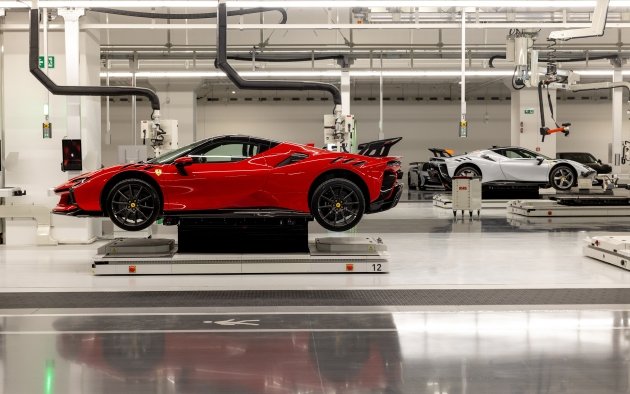
Ferrari: the E-Building factory in Maranello
The Maranello E-Building plant, inaugurated on June 24, 2024, embodies Ferrari's future in innovation and sustainability. Located in Maranello, Italy, this state-of-the-art facility is dedicated to the production of the brand's future electric vehicles. Designed to assemble high-performance electric models, the E-Building plans to launch the first all-electric Ferrari as early as 2025, followed by other models in the years to come. The $214 million investment in the plant reflects Ferrari's commitment to innovation and sustainability.
With a production capacity of up to 20,000 vehicles a year, the E-Building enables Ferrari to meet the growing demand for its hybrid and electric models, while optimizing space in its existing facilities for limited series models. This flexible and sustainable plant is designed to assemble electric vehicleshybrid and internal combustion vehicles, while using sustainable materials and advanced technologies to minimize its environmental impact.
Symbolizing Ferrari's entry into the electrification era, the E-Building marks an important milestone in the brand's history, demonstrating its commitment to innovation, performance and sustainability. Located near Ferrari's historic Maranello factory and built in two years, the E-Building employs around 300 people. This project represents a crucial milestone not only for Ferrari, but for the automotive industry as a whole, illustrating automakers' commitment to producing more sustainable vehicles.
Ferrari: the new E-Cell Lab center in Bologna, an innovation hub for the batteries of the future
The E-Cells Lab, inaugurated on April 8, 2024 at the University of Bologna, represents a new innovation hub for the batteries of the future. This research center, the fruit of collaboration between Ferrari, NXP and the university, is dedicated to the development of high-performance lithium-ion batteries. The main objective of the E-Cells Lab is to create more efficient, lightweight and durable batteries for Ferrari's future electric vehicles, while conducting in-depth research into battery materials and manufacturing processes. The lab also shares its knowledge and results with the scientific and industrial community.
Equipped with state-of-the-art facilities, the E-Cells Lab brings together a team of internationally renowned researchers and benefits from financial support from Ferrari, NXP and the University of Bologna. As the only center of excellence of its kind in Europe, the E-Cells Lab will make a significant contribution to the advancement of lithium-ion battery research, accelerating the development of more efficient and environmentally-friendly electric vehicles.
Conclusion
In conclusion, Ferrari is resolutely looking towards an electric future, with the launch of its first 100% electric model scheduled for 2025. New infrastructures, such as the E-Building factory in Maranello and the E-Cell Lab research center in Bologna, illustrate the brand's commitment to innovation and sustainability. With a strategy aimed at carbon neutrality by 2030, Ferrari combines cutting-edge technology and performance, while preserving its legendary DNA of luxury and sportiness.
For those interested in purchasing an electric vehicle or installing charging stationsBeev offers personalized support from its expert advisors to make your projects a reality.


